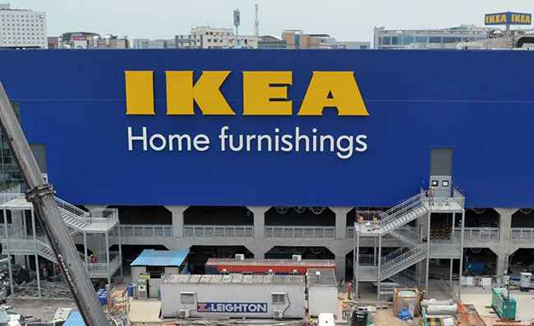MUMBAI, June 24, 2018 (BSS/AFP) – Furniture giant Ikea is set to open its
first store and restaurant in India after years of trying but arguably its
most famous item is off the menu — Swedish meatballs.
Ikea, the world’s biggest furniture retailer, will next month cut the
ribbon on a massive 37,000 square metre outlet in the southern city of
Hyderabad, complete with a 1,000-seater cafeteria.
The restaurant will be Ikea’s largest and will cater to local tastes, with
religious sensitivities in India dictating that beef and pork, staples of
Swedish meatballs, will not be served.
“There will be chicken meatballs and vegetarian balls,” Patrik Antoni,
Ikea’s deputy country manager for India, told AFP during an interview in the
Indian financial capital of Mumbai.
“Fifty percent of the food will be Swedish inspired, salmon and shrimp
dishes and so on. We’ll also have quite a few Indian dishes like dal makhani,
biryani, samosas,” he added.
The Swedish multinational, which revolutionised household furnishings with
its range of affordable ready-to-assemble products, is betting big on India
as it seeks new revenues away from its key Western markets.
Ikea plans to invest $1.5 billion in Asia’s third-largest economy as it
seeks to lure price-sensitive Indians away from satisfying their furniture
needs at local, family-run shops.
Ikea has already spent close to $750 million procuring sites for four
stores, including the Hyderabad one which will open in July on a date that is
yet to be announced.
Outlets in Mumbai, Bangalore and the capital New Delhi will follow, Antoni
said, without putting a timescale on them. He added that Ikea will then look
at Pune, Chennai, Ahmedabad, Surat and Kolkata.
“We are very bullish and excited about the Indian market. Normally, we
would test a market by opening one store but in India, we are going all out
and expanding,” said Antoni.
At 37,160 square metres the Hyderabad store will be comparable in size to
an average Indian shopping mall. It will have 850 employees and is expected
to attract several million visitors a year.
– Spice and all things nice –
As well as its wide range of international items Ikea will also sell goods
uniquely suited to the Indian market.
Alongside its popular Billy bookcases and Poang chairs, Ikea will also
offer spice boxes and kitchen appliances to make traditional Indian staples
such as idlis (rice cakes).
“We have done over a thousand home visits and interviewed people to try to
understand their needs, dreams, aspirations and how they feel about their
home,” explained Antoni.
More than 1,000 products priced under 200 rupees ($2.94) will be on sale.
India, with its abundant supply of cheap labour, is not known for its “DIY”
culture so Ikea has teamed up with UrbanClap, an online platform that helps
connect handymen with consumers.
Ikea, founded in 1943 by late Swedish entrepreneur Ingvar Kamprad, operates
418 stores in 49 markets. In May it announced that it would expand into South
America with stores in Chile, Colombia and Peru.
The home goods behemoth first tried to enter India in 2006 but was foiled
by strict foreign direct investment (FDI) rules that required foreign
companies to sign up with a local partner.
Seven years later the rules were relaxed to allow foreign businesses to own
retail stores operating under a single brand, clearing the way for Ikea’s
entry into India.
The Swedish company hopes its walk-in stores and famed restaurant will be a
unique selling point as it goes up against popular Indian online furniture
retailers Pepperfry and Urban Ladder.
It will also have to contend with Walmart. The world’s largest retailer has
agreed to buy a majority stake in Indian e-tailer Flipkart, which sells a
wide range of home furnishings.
Ikea’s global sales grew by five percent on-year in 2017 as it recorded
annual revenues of 38 billion euros ($47 billion).
The firm hopes access to India’s growing middle class in the country of
1.25 billion people will open up new revenue streams.
Analysts, however, warn it faces a long journey in a crowded market.
“Profitability will take some time for Ikea in India,” Sowmya Adiraju, an
analyst at research firm Euromonitor, told AFP.



